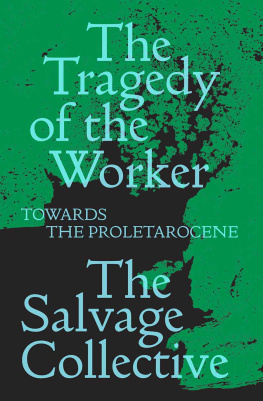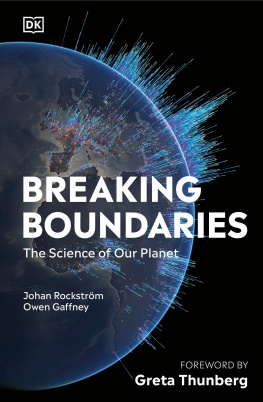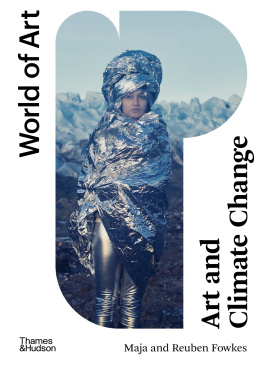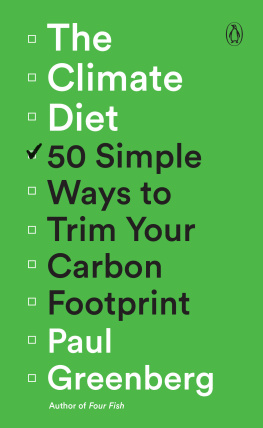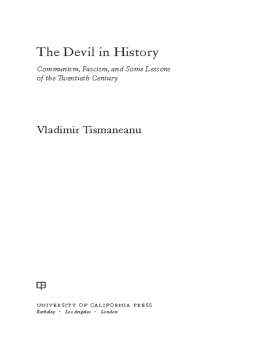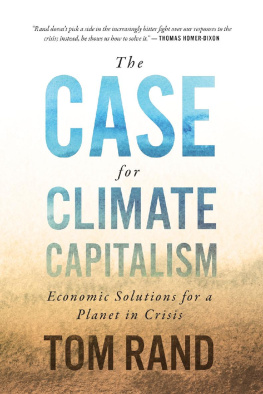Contents

The Tragedy
of the Worker
The Tragedy
of the Worker
Towards the Proletarocene
The Salvage
Collective

First published by Verso 2021
Jamie Allinson, China Miville, Richard Seymour, Rosie Warren 2021
All rights reserved
The moral rights of the authors have been asserted
1 3 5 7 9 10 8 6 4 2
Verso
UK: 6 Meard Street, London W1F 0EG
US: 20 Jay Street, Suite 1010, Brooklyn, NY 11201
versobooks.com
Verso is the imprint of New Left Books
ISBN-13: 978-1-83976-294-9
ISBN-13: 978-1-83976-295-6 (UK EBK)
ISBN-13: 978-1-83976-296-3 (US EBK)
British Library Cataloguing in Publication Data
A catalogue record for this book is available from the British Library
Library of Congress Cataloging-in-Publication Data
Library of Congress Control Number: 2021937570
Typeset in Sabon by Hewer Text UK Ltd, Edinburgh
Printed and bound by CPI Group (UK) Ltd, Croydon CR0 4YY
To Neil Davidson
Contents
Workers of the world unite, you have nothing to lose but your chains. You have a world to win.
What if the world is already lost?
This is the question that vexed us as we set out to write The Tragedy of the Worker. From the vantage point of the present, the history of capitalist development is, as Marx expected, the history of the development of a global working class, the proletarianisation of the majority of the worlds population. But the very same process of that development has brought us to the precipice of climate disaster. Our position, to recall Trotskys rationalisation of War Communism in 1920, is in the highest degree tragic.
It is now clear that we will pass what scientists have long warned will be a tipping point of global warming, accelerating the already catastrophic consequences of capitalist emissions. How do we imagine emancipation on an at best partially habitable planet? Where once communists imagined seizing the means of production, taking the unprecedented capacities of capitalist infrastructures and using them to build a world of plenty, what must we imagine after the apocalypse has befallen us? What does it mean that as capitalism has become truly global, the gravediggers it has created dig not only capitalisms grave, but also that of much organic life on earth?
Our answers to these questions remain rooted in the politics of revolutionary communism. Our stance is not based on the fantasy of a homeostatic nature that must be defended but on the critique of the capitalist metabolism the Stoffwechsel- that must be overthrown. Earth scientists are accustomed to speak in terms of cycles by which substances circulate in different forms: the water cycle, the rock cycle, the nitrogen cycle, the glacial-interglacial cycle, the carbon cycle, and others. One way of registering the catastrophe of climate change is to see these cycles most of all, but not solely, the carbon cycle as disordered, under- or over-accumulating. But this is to ignore the more fundamental circuit of which these now form epicycles, like Ptolemys sub-orbits of the heavenly bodies: the circuit of capital accumulation, M-C-M.
This circuit accumulates profit and produces death. Neither is accidental. It is for this reason that the debates that capitalist ruling classes permit among themselves on adaptation versus mitigation take place on false premises. What is to be mitigated is the impact of climate change on accumulation, rendered through the ideology of growth as something that benefits everyone. What we are to adapt to are the parameters of accumulation, sacrificing just enough islands, eco-systems, indigenous and non-indigenous cultures to maintain its imperatives for a period of time until new thresholds must be crossed, and new life sacrificed to the pagan idol of capital. Already, capitalist petro-modernity builds a certain quantum of acceptable death into its predicates: at the very least, the 8.7 million killed by fossil fuels each year according to Harvard University are considered a price worth paying for the stupendous advantages of fossil capital. And the sky can only keep going up, as deforestation, polar melt, ocean acidification, soil de-fertilisation and more intense wildfires and storms tear the web of life into patches. If the necropolitical calculus of the Covid-19 pandemic appears crass, just wait until its premises are applied to climate catastrophe.
Revolution is mitigation and adaptation. To the extent that a habitable zone is to be preserved on earth, our ways of making, thinking, eating, moving, and living are going to have to change. In other words, a new mode of production. This too will be an adaptation.
But are there not signs, as the revanchist climate denialism of Donald Trump leaves (perhaps temporarily) the political stage, of hope in the system correcting itself? With Bidens election as president, the Paris Accords are restored. A series of executive orders increasing the use of wind power, limiting oil and gas exploration and drilling, and halting the construction of the Keystone XL pipeline. This is at least evidence that ecosocial movements have made some impact, however limited, on the coordinates of capitalist realism in the Democratic Party. The struggle for survival achieves some traction with the more far-sighted elements of capital. However, even if Bidens approach didnt bring its own implicatory denialism concerning the depth and scope of social transformation required to achieve habitability, and even if the Paris Accords did not in their own terms permit catastrophic warming of an estimated 3.4 degrees above pre-industrial levels, the forces of denialism remain globally strong. And climate disaster intensifies climate denialism. In Oregon, wildfires are blamed on Antifa activists, not the arsonists behind Amazon deforestation. In Texas, the snowstorms and power outages are blamed on environmentalism and the Green New Deal, which has nowhere been implemented. However occultedly death-driven, denialism harnesses the material-symbolic aspirations of hundreds of millions of people, which include not just prosperity, national development, social uplift and individual autonomy, but also social distinction. Denialism, by describing climate science as a Chinese or Third World scam to redistribute the worlds wealth, promises that those who have been at the top of the world system and are downwardly mobile, or have been climbing the developmental leader and are precariously situated, will not be hurled into the same social situation as the mass of humanity.
The left has its own accounts to keep. The Stalinist reversion of the workers Red October submerged an incipient ecological Bolshevism, which might have weaned historical materialism from its productivist predicates, just as it did any form of proletarian democracy. The conception of socialism as a new and better form of growth remains with us, the collapse of 1991 notwithstanding. In the debate between ecomodernist socialists and their opponents, we insist that the former are not Promethean enough. The fundamental premise of historical materialism is that being determines consciousness. Who are we, the wounded victim-comrades of too-late-capitalism, to legislate for those who (we hope) will come after? So great is the change demanded to preserve a habitable biosphere that, if we make it, our inheritors on the other side will read such texts and wonder, as we do of Bronze Age epics; were these people even human?
Is human the right word for us now? The coinage of the Anthropocene implies a common Anthropos to whom common responsibility and common guilt can be ascribed. With good reason, the colonised, excluded and oppressed object that they were not the ones who broke the climate and so should not be expected to pay the consequences. In this lies the kernel of truth in fixations on indigenous cosmologies as sources of resilience, a form of world-historical mindfulness training, with which to face the disaster. But capitalogenic climate breakdown is a real abstraction, not an ethical choice or epistemological preference. The value-form world has already been made counting not least among its authors the genuinely Promethean efforts of national bourgeoisies of colour and there are no others left. The only way is through, not out.

